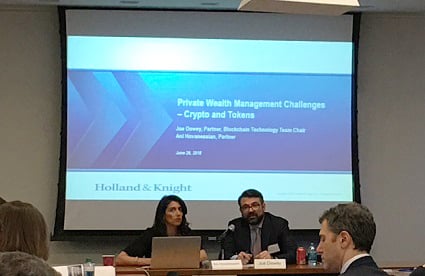Private Wealth Challenges Presented with Virtual Currency

Ani Hovanessian and Joe Dewey presenting at the Blockchain program.
On June 26, 2018, Partners Ani Hovanessian and Joe Dewey presented on the various private wealth challenges connected to virtual currency. Ms. Hovanessian, an attorney in the Private Wealth Services Group, focused on the tax and estate planning issues involved, while Blockchain Technology Team Chair Mr. Dewey shared his technological knowledge on the subject matter. The audience of around 75 people was filled with professionals in various industries, such as financial advisors, public accountants, in-house legal counsel, and other Holland & Knight peers.
Ms. Hovanessian provided an overview regarding how virtual currency is treated for income and estate tax purposes, as well as strategies that can be utilized when planning for clients that have significant virtual currency holdings. She noted that due to the age of many virtual currency holders, it can be more difficult to implement many of these strategies; however, planning remains important, especially considering the unique nature of the asset. Ms. Hovanessian shared the example of the estate of Matthew Mellon. The heir of the Mellon banking family reportedly held between $100-500 million dollars of the virtual currency XRP at the time of his death in April 2018. Mr. Mellon had also been paranoid about security, and thus kept the private keys to the XRP in cold storage on nano-memory cards under the names of other people at various locations around the U.S. After his sudden death, the executor and beneficiaries of his estate have been left to try to track down the whereabouts of these private keys. Additionally, since the virtual currency was not titled into a revocable trust, it will have to go through probate.
Mr. Dewey continued the discussion on the importance of maintaining access to your key if you store virtual currency in a private wallet, away from a digital exchange. Because of the security risks associated with holding virtual currency on a digital exchange, such as Coinbase, many individuals decide to store their virtual currency offline. Mr. Dewey shared numerous examples of individuals who have lost access to significant amounts of wealth stored in virtual currency as a result of no longer having access to their private key. Being a Nebraska native, Mr. Dewey also brought up how the state of Nebraska issued an advisory opinion in September 2017 stating that attorneys may now receive and accept virtual currencies as payment for legal services. However, in order to mitigate the risk of volatility and possible unconscionable overpayment of services, the attorney should convert the virtual currency to U.S. dollars immediately upon receipt.
Following the presentations, members of the audience asked thought-provoking questions on various tax and technology related issues. One attendee brought up the issue of whether an exchange of one virtual currency with another virtual currency would trigger a taxable event. While the Internal Revenue Service (IRS) has been hesitant to issue guidance on many virtual currency topics, Mr. Dewey and Ms. Hovanessian agreed that it would most likely be seen by the IRS as a taxable event since this would be seen an exchange of virtual currency. In addition, it was pointed out that the recent tax law changes to Section 1031 of the Internal Revenue Code no longer allow personal property to qualify for tax deferral, even if the personal property is used in a trade or business.
Stay tuned for a piece coming out in which Ms. Hovanessian will expand on the estate planning issues individuals should be on the lookout for when dealing with virtual currency.
